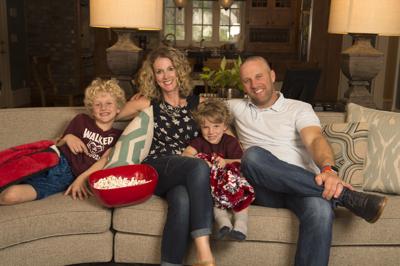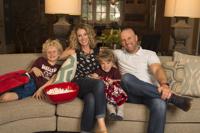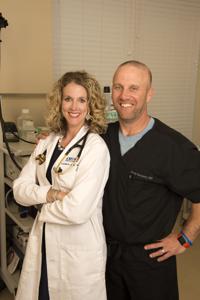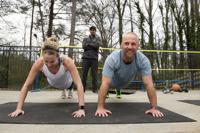
Drs. Elizabeth and Greg Nesmith.

Drs. Elizabeth and Greg Nesmith, work out in their exercise space at their Marietta home. They are coached by their trainer T.J. Toups.


Drs. Elizabeth and Greg Nesmith with sons Jackson, 9, and Beckett, 6, watch football game on television in their Marietta home.
Robin Rayne Nelson“I was the girl who passed out every time I had to give blood. I even fainted when I was getting my ears pierced. I smelled the alcohol and saw that needle and down I went,” she recalls with a grin. “But I got over it.”
Dr. Greg Nesmith found her story endearing after they began working together “on rounds” at Atlanta’s Grady Hospital, where Emory University medical students get their hands-on experience.
She was an intern in her second rotation, assigned to see patients with gastrointestinal problems. He had already completed his medical training and was a gastroenterology fellow, assigned to supervise her training that rotation.
“He was my boss,” she chuckled. “Interns do the all the scut work. I would see the patients and report back to him and tell him what I thought. He would agree or disagree and order tests and procedures. He reported to the attending physician who was higher up,” she explained.
Their days at Grady were long and their work was exhausting, leaving little time for anything else. Still, they managed to become good friends.
“Sometimes we would meet for breakfast after I did night shifts,” she recalled.
They fell in love, became engaged and married in the space of 18 months.
“We were on the fast track because medical school takes up so many years,” she explained.
The couple moved to Marietta in 2008 to begin their careers. She’s now an internal medicine physician in Woodstock. He’s part of a large gastroenterology practice near Kennestone Hospital.
“I grew up in a very classic blue-collar family in Indiana,” said Elizabeth. “Most of my extended family didn’t go on to college, but I wanted to become a veterinarian. I had jobs since I was 15 because I had to pay for college and everything myself. My first job was as a lifeguard at Lake Michigan where I had to learn CPR.”
It was during another job several years later as a cashier in a large supply store when her goal to become a veterinarian dramatically changed.
“Somebody ran up to me at the register and said a customer had collapsed back in building supplies,” she said. “I guess they knew I had been a lifeguard and knew CPR. I rushed over to where everyone was just circling around him. They were in a panic. His wife was crying. Nobody knew what to do, so I started CPR on him. He came back and started breathing again. I watched the paramedics work on him once they arrived.”
“I was going to vet school but I realized at that moment that I wanted to help people instead,” said Elizabeth. “I called my dad later and told him I was changing. I said I wanted to be a doctor and go to medical school. He said, ‘Are you sure?’ They thought I was crazy.”
She visited Emory University that winter.


Drs. Elizabeth and Greg Nesmith.
Robin Rayne Nelson“It was cold and grey and 30 degrees in Indiana,” she said. “It was 70 degrees in Atlanta. I said, ‘This is it, I’m staying,’ and transferred to Emory’s medical school program.”
“I don’t have a dramatic story to tell,” said Greg. “I just knew I would be a doctor. It wasn’t my parents telling me or anything like that. I really have no idea where that idea came from. I just knew I wouldn’t ever be anything else but a doctor.”
Greg grew up in Jacksonville, Fla.
“Everyone looked to Atlanta as the big city,” he recalled.
Comfortable in his southern roots and upbringing, he had no desire to go further than Atlanta for his medical school education.
Their demanding and hectic days are filled with scores of patients, not enough time, lab orders, test results and “way too much paperwork,” but they love their work and their life together, which now includes sons Jackson, 9, and Beckett, 6.
“We live practically across the street from Greg’s office. He walks to work and comes home for lunch. My drive to Woodstock takes fifteen minutes, “she said.
Sports is a big deal in their home, and both boys are active in baseball.
“Family is our priority,” Greg said. “We make sure at least one of us is at every practice or game. We both enjoy our jobs because they are fluid. You talk to other people and work is just work. But it’s fun at our work and fun at our house.”
“We’re very fortunate in that both of our fields are flexible,” he added. “It’s not something you go into if you want to be super rich, but we’re comfortable. I would still do this even if my income were cut significantly.”
“We’ll drive separate cars if we go to the movies, just in case I get called out for an emergency, to stop acute internal bleeding or extract food that got stuck, but that doesn’t happen often,” he said.


Drs. Elizabeth and Greg Nesmith, work out in their exercise space at their Marietta home. They are coached by their trainer T.J. Toups.
Robin Rayne Nelson“I’m the kind of doctor every adult should have,” Elizabeth explained. “An internal medicine doctor sees everyday issues with adults, like colds, diabetes and high blood pressure. I’m a generalist and we take walk-in patients in our clinic.”
Their biggest professional challenge is the insurance system and ‘defensive medicine’ they must sometimes order to avoid lawsuits.
“We’re of the generation of physicians where everything is already in place. We’re not like some of the older doctors who burned out because of all the changes in medical care and paperwork. We know how to jump through the hoops without arguing about getting a test done,” Greg noted.
Elizabeth tires of all the clicks she must make on each patient and prior authorizations with insurance companies, just so her patients get the care they need.
“I think the insurance system gets in the way of proper medical care,” she said.
As with most medical practices, her office schedules increasing numbers of patients in a typical day just to keep the office going. Reimbursements from insurance companies keep going down, and Elizabeth said she can see as many as 36 patients in a day — many days with barely enough time to eat.
“Fewer and fewer medical students go into primary care because they won’t earn what the specialists do,” she noted. “But I love my patients. Several have even brought presents for my boys at Christmas. We feel very blessed.”
Please purchase a subscription to read our premium content. If you have a subscription, please log in or sign up for an account on our website to continue.
Success! An email has been sent to with a link to confirm list signup.
Error! There was an error processing your request.
Get up-to-the-minute news sent straight to your device.
Please disable your ad blocker, whitelist our site, or purchase a subscription
Submitting this form below will send a message to your email with a link to change your password.
An email message containing instructions on how to reset your password has been sent to the e-mail address listed on your account.
Thank you. Your purchase was successful.
| Rate: | |
| Begins: | |
| Ends: | |
| Transaction ID: |
A receipt was sent to your email.
(0) comments
Welcome to the discussion.
Log In
Keep it Clean. Please avoid obscene, vulgar, lewd, racist or sexually-oriented language.
PLEASE TURN OFF YOUR CAPS LOCK.
Don't Threaten. Threats of harming another person will not be tolerated.
Be Truthful. Don't knowingly lie about anyone or anything.
Be Nice. No racism, sexism or any sort of -ism that is degrading to another person.
Be Proactive. Use the 'Report' link on each comment to let us know of abusive posts.
Share with Us. We'd love to hear eyewitness accounts, the history behind an article.